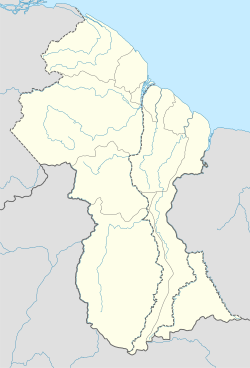Maruranau (Wapishana: Marora Naawa;[3] also: Maruranawa[4]) is an indigenous village of Wapishana Amerindians in the Upper Takutu-Upper Essequibo Region of Guyana.[2] It is located in the Rupununi savannah near the Kwitaro River on the edge of the Kanuku Mountains.[3][5] A minority of Taruma also inhabit the village.[3]
Maruranau
Marora Naawa | |
|---|---|
village | |
| Coordinates: 2°44′48″N 59°09′36″W / 2.7468°N 59.1599°W | |
| Country | |
| Region | Upper Takutu-Upper Essequibo |
| Government | |
| • Toshao | Ambrose Bento (2021)[1] |
| Area | |
• Total | 282.61 km2 (109.118 sq mi) |
| Population (2012)[2] | |
• Total | 830 |
| • Density | 2.9/km2 (7.6/sq mi) |
History
editThe Wapishana used to live in small settlements. They were concentrated in larger settlements by the Catholic missionaries. In 1919, it was decided by the village leadership and the priest to relocate 5 miles (8.0 km) north to the present location of Maruranau due to frequent flooding.[5] The name of the village means "Giant Armadillo Hill".[3]
Overview
editIn October 1947 the first primary school was established in Maruranau.[5] The village has a health centre and shops.[2] There is no electricity, internet or mobile phone.[2][3] In 2018, water wells were drilled as part of a joint exercise of the Guyana Defence Force and the Brazilian Army.[4] The economy is mainly based on subsistence agriculture, ranching, hunting and fishing.[3] Balata bleeding, a natural latex, used to be part of the economy.[3] The main religions are the Catholic Church and the Open Brethren.[2]
Languages
editWapishana is the primary language in Maruranau, and English the secondary language. It is one of the few villages which has kept their language alive.[5][2] Maruranau is also home to three speakers of the Taruma language. They were formerly regarded as its only speakers, but another family has since been discovered in Lethem.[6][7]
Transport
editMaruranau can be reached by road from Lethem which takes about 4 hours by bus.[8] The village can be accessed by air via the Maruranawa Airport.[9]
References
edit- ^ "Rise in COVID cases in Deep South Rupununi spurs uptake in vaccines". Stabroek News. 4 May 2021.
- ^ a b c d e f g "Maruranau". Ministry of Amerindian Affairs. Retrieved 31 July 2022.
- ^ a b c d e f g "Marora Naawa Village". Wapichanao @ Community Lands. Retrieved 31 July 2022.
- ^ a b "Drilling of water wells in eight Rupununi villages set". Stabroek News. 8 March 2018. Retrieved 31 July 2022.
- ^ a b c d "Mararunau- keeping their Indigenous language alive". Department of Public Information. 21 August 2017.
- ^ "Taruma". Endangered Languages. Retrieved 31 July 2022.
- ^ Eithne Carlin (2006). "Feeling the need". Grammars in contact: A cross-linguistic typology. Oxford: Oxford University Press: 315.
- ^ "Maruranau Village – 100 Miles Into the Amazon Rorest". Guyana South America (in Dutch). Retrieved 31 July 2022.
- ^ "SYMW - Facility". Great Circle Mapper. Retrieved 31 July 2022.
